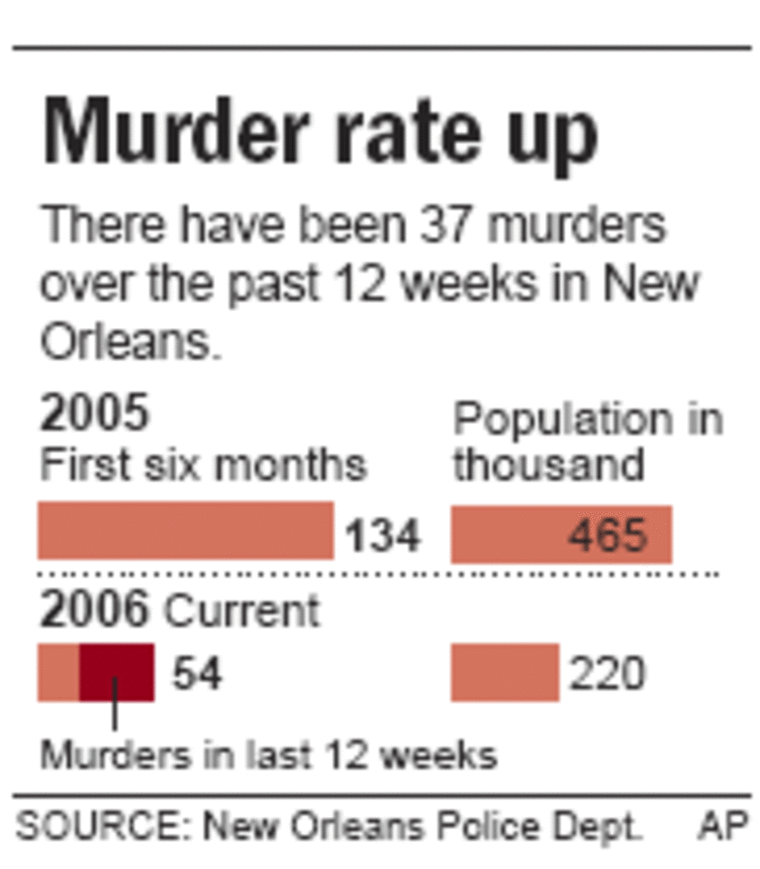Nine months after they rode to the rescue in the desperate aftermath of Hurricane Katrina, National Guardsmen carrying M-16s returned to the city Tuesday to reinforce a depleted police department and battle a surge in violence.
The 100 or so soldiers will patrol the streets in ravaged neighborhoods left deserted by Katrina, freeing up police officers to concentrate on more heavily populated sections.
“We’re just trying to give a hand to the city of New Orleans,” said Lt. Melvin Edwards, 32, a member of 239th Military Police Company.
Gov. Kathleen Blanco sent in the National Guard at the mayor’s request after a bloody weekend in which six people were killed.
“Criminals, hear me loud, hear me clearly: There is law and order in New Orleans,” she said. “We will not let the criminals take root as our families return.”
The troops, dressed in full camouflage fatigues, carried M-16s, handguns and belt clips of ammunition as they arrived in a convoy of 75 vehicles. They parked their Humvees and tanker trucks in formation in front of the Convention Center, drawing waves and thumbs-up from onlookers.
Up to 200 more Guardsmen will be sent in later, bringing the total in the city to 300. In addition, 60 state police officers were sent to help keep the peace.
Citizens feel ‘very safe’
As the soldiers arrived, New Orleans police were investigating another slaying, that of a 22-year-old man. The killing brought this year’s murder toll to 54. That number is still less than the 81 recorded during the first four months of 2005. But New Orleans’ population these days is less than half of what it was before Katrina.

The bloodshed has raised fears that violence is back on the rise in a city that was plagued by crime before Katrina drove out half its population of 465,000.
Community leaders are afraid the violence will discourage people from returning.
King Milling, a New Orleans banker, said he was “just delighted” by the troops’ arrival. “The powers-that-be recognize that this is an issue that we must deal with,” he said.
Many of the soldiers that arrived Tuesday were sent to New Orleans during Katrina, but they had not seen the city since those desperate days.
Sgt. Alfred Glasper of Baton Rouge looked for signs of appreciation as he steered a tan Humvee down Interstate 10 into the heart of the city.
“There you go,” he said, pointing to a man stopped on the side of the highway and waving. “People down here didn’t want us to leave — they felt very safe.”
Later, the troops marched to an office building at the port of New Orleans, where they were briefed on their mission. Patrols were to begin Tuesday night.
‘We’re in the disaster phase’
Mayor Ray Nagin had asked for help from the National Guard and state police on Monday after five teenagers in an SUV were gunned down Saturday in the city’s deadliest attack in at least 11 years. Police said it was apparently motivated by drugs or revenge. In a separate attack, a man was stabbed to death Sunday.
Capt. Alfred Travis, the company commander, said the Guard’s mission was “still part of Katrina.”
“We’re in the disaster phase, and I think we may be in the disaster phase for a while, until the neighborhoods are built up again,” Travis said.
The National Guard had as many as 15,000 soldiers in the city in the weeks after Katrina. As many as 2,000 stayed until February.
The police force is down to about 1,375 officers, compared with about 1,750 before Katrina.
“I think people are happy they’re doing something,” said Nathan Chapman, president of a neighborhood organization. “The most important thing is that we fix the problem, not pretend we don’t have one.”
Bad PR move?
But Cherie Kerr, who runs a Santa Ana., Calif., public-relations firm that specializes in crisis, said the move gives the impression that crime is out of hand.
“When you call in the National Guard, you’re pretty much saying you’re out of control,” Kerr said.
Noel Scallan, executive assistant at a luxury French Quarter hotel, said calls poured in from people planning to attend a national library convention moments after it was announced that the National Guard would be sent in.
“They got panicky — ‘What’s going on? Is it OK?”’ Scallan said. But there were no cancellations, he said.
But Bill Walker, general manager of a French-style manor on Bourbon Street, called the move “very positive,” saying nothing would panic his guests more “than if the crime were to increase.”
New Orleans Police Superintendent Warren J. Riley said Monday he had asked in March to have troops sent in this summer, when the population is expected to increase because FEMA assistance to displaced hurricane refugees ends June 30.
Riley insisted his department is capable of controlling crime, saying: “This is not a situation where anything is out of control.”